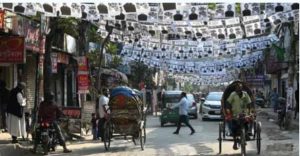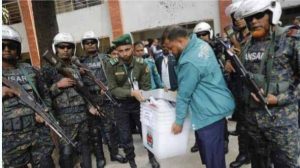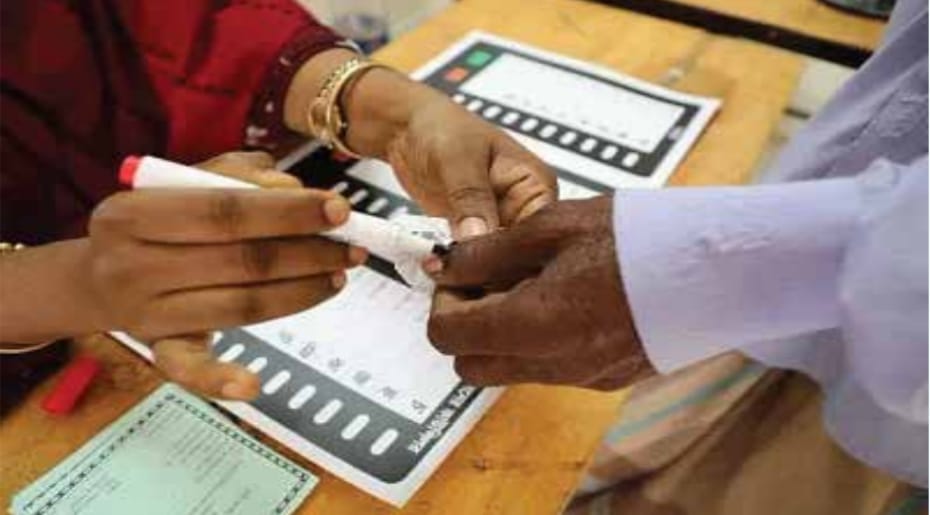In Bangladesh, elections are celebratory events as they allow voters to shake hands with politicians, who often remain too busy to mingle with the voters once they are elected until the next round of elections comes. But like many developing countries, elections in Bangladesh often result in violence, with the opposition parties seldom agreeing to the results, calling it unfair and rigged. This has led to three types of Caretaker Government (CTG) in Bangladesh, mainly to contain violence and hold free and fair national elections. One in 1990-1991 under the incumbent Chief Justice of Bangladesh, who led an interim government until the elections were held in February 1991. This could be called Type 1, which resulted from mass agitation against the military, calling the latter to withdraw from politics and return to the barracks. Save for ten months in 1981-1982, Bangladesh remained under military rule since 15 August 1975 when the Father of the Nation, Bangabandhu Sheikh Mujibur Rahman, was brutally killed along with his family members by a section of the military in a coup d’état. However, the return of civilian rule in 1991 polarized the country into two civil platforms, one led by the Awami League (AL) and the other led by the Bangladesh Nationalist Party (BNP). Following mass agitation under the leadership of the Awami League in 1994-1996, Bangladesh formed the second type of CTG in March 1996, within the constitutional framework, with the legal obligation of conducting national elections within three months of the expiry of a government’s tenure.
 Only two national elections, the 7th Parliamentary Election in June 1996 and the 8th Parliamentary Election in October 2001, were held under Type 2. This is because the BNP-led government tried to manipulate the constitutional framework of the CTG in 2006, which, following mass agitation once again under the leadership of the AL, led to the third type. This has been referred to as the military-backed CTG. The latter remained in power for two years (2007-2008) on the grounds of fixing fake voter registration and producing national identity cards for all citizens of the country. Type 3 CTG was qualitatively different from the first two, which made the AL, after winning the national election with an overwhelming majority in December 2008, rethink the CTG system. In 2011, the AL-led government abolished the CTG by passing the 15th Amendment of the Bangladesh Constitution with a two-thirds majority in the National Parliament. The opposition BNP and other like-minded political parties, along with some members of civil society, protested the change, unmindful that it was the BNP that earlier objected to such a system and later tried to manipulate it to its benefit. Most opposition parties, or what could be labeled as anti-AL forces, still longed for the CTG system, arguing for its fairness and merit in holding peaceful national elections.
Only two national elections, the 7th Parliamentary Election in June 1996 and the 8th Parliamentary Election in October 2001, were held under Type 2. This is because the BNP-led government tried to manipulate the constitutional framework of the CTG in 2006, which, following mass agitation once again under the leadership of the AL, led to the third type. This has been referred to as the military-backed CTG. The latter remained in power for two years (2007-2008) on the grounds of fixing fake voter registration and producing national identity cards for all citizens of the country. Type 3 CTG was qualitatively different from the first two, which made the AL, after winning the national election with an overwhelming majority in December 2008, rethink the CTG system. In 2011, the AL-led government abolished the CTG by passing the 15th Amendment of the Bangladesh Constitution with a two-thirds majority in the National Parliament. The opposition BNP and other like-minded political parties, along with some members of civil society, protested the change, unmindful that it was the BNP that earlier objected to such a system and later tried to manipulate it to its benefit. Most opposition parties, or what could be labeled as anti-AL forces, still longed for the CTG system, arguing for its fairness and merit in holding peaceful national elections.
Let me, at this stage, debunk two myths. One is the peaceful nature of national elections held under the CTG. Save for the 9th Parliamentary Election of 2008, held under the military-backed CTG, none of the national polls was peaceful (Figure 1). The 8th Parliamentary Election of 2001 saw 248 violent deaths. Incidentally, the military-backed 9th Parliamentary Election of 2008 had the lowest death figure (only 21) compared to even the 5th Parliamentary Election of 1991, which saw 49 violent deaths. To back this contention further, the 10th Parliamentary Election of 2014, held under the elected incumbent government, which was equally fierce, saw 142 deaths, lower than the CTG-backed 8th Parliamentary Election of 2001. The above figures are based on four weeks of mapping of electoral violence – three weeks before and one week after Election Day. This time, in the 12th Parliamentary Election, again held under the elected incumbent government, and based on ten weeks of mapping, there were 30 deaths, still significantly lower than the 5th Parliamentary Election of 1991. Even if one maps election-related violence from 28 October 2023, when major violence took place in Dhaka, the number of deaths still remained lower than the 2001 Parliamentary Election (44 overall deaths) (Figure 2). I must quickly add here that a single death is painful, more so for the family members. Still, sadly, a comparison of the scale of electoral violence could only be made through a numerical representation of deaths, injuries, and incidents.
Figure 1
Electoral violence
| Inter-party election violence | All other election-related violence | |||
| Elections | Incidents | Deaths | Injuries | Overall Death |
| 5th Parliamentary Election 1991 | 39 | 31 | 590 | 49 |
| 6th Parliamentary Election 1996 (15 February) | 56 | 18 | 1382 | 51 |
| 7th Parliamentary Election 1996 (15 June) | 51 | 27 | 979 | 45 |
| 8th Parliamentary Election 2001 | 345 | 150 | 9174 | 248 |
| 9th Parliamentary Election 2008 | 73 | 10 | 836 | 21 |
| 10th Parliamentary Election 2014 | 77 | 41 | 2603 | 142 |
| 11th Parliamentary Election 2018 | 175 | 33 | 2537 | 61 |
| 12th Parliamentary Election 2024 | – | 07 | – | 30 |
Source: Bangladesh Peace Observatory, Centre for Alternatives, Dhaka, 15 January 2024.
Figure 2
Electoral violence from 28 October 2023 to 11 January 2024
| Motives | Inter-party tensions | Intra-party tensions | Other political issues | Grand Total |
| 28-Oct | 2 | 2 | ||
| 29-Oct | 1 | 1 | 2 | |
| 31-Oct | 4 | 4 | ||
| 2-Nov | 1 | 1 | 2 | |
| 4-Nov | 2 | 2 | ||
| 11-Nov | 1 | 1 | ||
| 12-Nov | 1 | 1 | ||
| 18-Nov | 1 | 1 | ||
| 21-Nov | 1 | 2 | 3 | |
| 23-Nov | 1 | 1 | ||
| 4-Dec | 1 | 1 | ||
| 5-Dec | 1 | 1 | ||
| 11-Dec | 2 | 2 | ||
| 13-Dec | 1 | 1 | ||
| 18-Dec | 1 | 1 | ||
| 19-Dec | 5 | 5 | ||
| 23-Dec | 1 | 1 | ||
| 29-Dec | 1 | 1 | ||
| 30-Dec | 1 | 1 | ||
| 03-Jan | 1 | 1 | ||
| 04-Jan | 1 | 1 | ||
| 05-Jan | 4 | 4 | ||
| 07-Jan | 2 | 2 | ||
| 08-Jan | 1 | 1 | ||
| 09-Jan | 1 | 1 | ||
| 11-Jan | 1 | 1 | ||
| Grand Total | 12 | 4 | 28 | 44 |
| Three weeks before and one week after the election day. | 7 | 3 | 20 | 30 |
Source: Bangladesh Peace Observatory, Centre for Alternatives, Dhaka, 15 January 2024.
The second myth is that the major political parties were becoming more tolerant of each other with each CTG-backed national election. Therefore, if the system is continued, it will contribute to peaceful elections, and the parties will gradually learn to tolerate each other. To debunk this myth, let us calculate the number of boycotts by the opposition party in the National Parliament. If anything, it has increased progressively for the worse, from 34 percent in the 5th Parliament, 43 percent in the 7th Parliament, 60 percent in the 8th Parliament, and 83.38 percent in the 9th Parliament in 2009-2014. If over 80 percent of the parliamentary sessions are boycotted by the opposition party, why call it a democracy? Moreover, what a waste of public money! But more significantly, the politics of protracted parliamentary boycotts only indicates that the major political parties are now engaged in what could be referred to as mega-identity politics.
In Bangladesh, the political identities of two major political platforms, led by AL and BNP, have become political mega-identities, with contradictory positions on the 1971 liberation war, the 1971 genocide, the Father of the Nation, the brutal killing on 15 August 1975, and, on top of this, the 21 August 2004 grenade attack on the then-opposition leader, now prime minister, Sheikh Hasina. Trust between major political parties is the minimum pre-condition required for holding national elections under the Westminster system. I’m afraid that after the 21 August 2004 grenade attack, such trust has gone down to zero. And no one, not even the Western countries, is investing in the issue of building trust between the major political parties. On the contrary, such countries, even their supporters inside Bangladesh, are fuelling the mistrust in the name of democracy and human rights. This is unfortunate because the Western countries, under the leadership of the United States, are now complicit, if not directly involved, in Israel’s genocide against the Palestinians. Their call for democracy, fairness, and human rights runs hollow. This remains clear from the mass protests in thousands and, in some cases, millions in London, New York, Sydney, Toronto, Washington DC, Berlin, Madrid, and many other Western cities, calling their respective governments not to aid a genocidal regime in Israel.

However, this should not imply that Bangladesh’s democracy is perfect. On the contrary, there is a democratic deficit in conducting free and fair elections. But then, as Patrick Loch Otieno Lumumba, the Kenyan lawyer, noted, “There is no nation in the world without trials and tribulations.”[1] But whatever the scale of the trials and tribulations or the democratic deficit in Bangladesh, it is the responsibility of the people of Bangladesh to fix it. No external power can or ought to police Bangladesh in this endeavour. External powers’ meddling in domestic politics complicates the efforts to reach a political consensus as it tends to polarize the political parties further. Moreover, such meddling invites geopolitical attention, which, in the age of multipolarity, makes other prominent global actors equally eager to take sides, often diametrically opposite to each other, making the people even more fearful of the intention of the external powers. In this context, one can only take solace from Rabindranath Tagore’s words, “মানুষের প্রতি বিশ্বাস হারানো পাপ (I shall not commit the grievous sin of losing faith in humans).”[2] Only the people of Bangladesh, through their political activism, insights, and imagination, can transform democracy deficit into democracy surplus.
The moot question then becomes, what is to be done? There are many ways to respond to this question. One would be to delve into the meaning of democracy. In a massive survey in five South Asian countries in 2004-2005, when the question was asked about the meaning of democracy, 40 percent of South Asian masses responded by saying, “basic necessities” or food, clothing, health, and shelter.[3] Only 17 percent said election or “power to change the government.” In Bangladesh’s case, 52 percent said “basic necessities,” much higher than the South Asian average, and only 13 percent said, election, which remains lower than the South Asian average. This could be one clue why the Sri Lankans came out on the streets in thousands despite having free and fair elections and forcefully entered the President’s House to force the Rajapakse government to resign. Lack of having access to “basic necessities” certainly played a role. Contrariwise, the same could be the reason why the opposition parties in Bangladesh failed to attract the support of the masses for keeping their campaign only on the “election” and not on how they would make a difference from the ruling party on the question of “basic necessities,” which the latter has been relatively successful in addressing.
[1] See https://www.youtube.com/watch?v=xR1f3g0TYJU. Accessed on 15 January 2024.
[2] Tagore, “Crisis in civilization,” in Sisir Kumar Das (Ed.), The English writings of Rabindranath Tagore, Vol. III (New Delhi: Sahitya Akademi, 1996), pp. 722–726.
[3] SDSA Team co-edited, State of Democracy in South Asia: A Report, (New Delhi: Oxford University Press, 2008), p. 27.
Written by-
Dr. Imtiaz Ahmed
Professor of International Relations University of Dhaka


